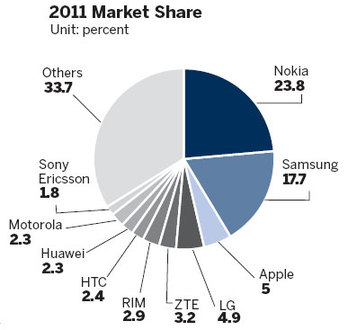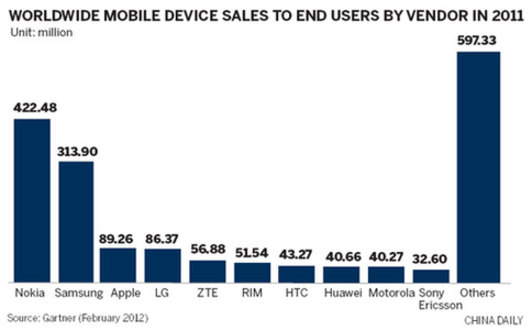
|
 ZTE Corp launches two smartphones running on the Android system, Blade and Racer II and a tablet V9+, in Bangkok, Thailand, in January. ZTE and Huawei Technologies both wish to challenge the dominant positions of world giants in the smartphone sector. [Photo/Xinhua] |
Branding and innovation vital for firms to compete with world giants
ZTE Corp and Huawei Technologies Co Ltd, both among the world's top five telecom gear makers, want to challenge the dominant positions of Apple Inc and Samsung Electronics Co Ltd in the global high-end smartphone market.
Analysts said, however, that the Chinese companies would struggle to catch up with Apple and Samsung. They also said the two Chinese companies should pay more attention to branding and innovation.
|
 |
Huawei and ZTE, which started in the equipment segment where they competed with Sweden's Telefon AB, LM Ericsson and Nokia Siemens Networks, have diversified since 2009 into mobile phone production and enterprise IT services.
He Shiyou, executive vice-president of ZTE, said on Monday in Shenzhen that ZTE aims to expand its share of the global mid- to high-end smartphone market and reverse gross profit margin declines in its handset business.
ZTE, the world's fifth mobile phone vendor, aims to at least double smartphone shipments this year to more than 30 million. He said the percentage of mid- to high-end smartphones will also double.
ZTE has said it could be shipping 100 million smartphones a year by 2015, according to Reuters.
"We want to put pressure on Apple and Samsung in the mid- to high-end smartphone market," He added.
ZTE will face difficulties if it focuses on low-end mobile phones, so it must explore new opportunities, He said.
Huawei, also based in Shenzhen, entered the high-end smartphone market in a more conspicuous way by spending heavily on promotions and sponsoring the Italian Supercoppa (Italian Super Cup) last year.
"Huawei is planning to have a broader portfolio. The high-end smartphone will boost our reputation greatly and help branding," said Wang Weijun, China president of Huawei Device Co Ltd.
Huawei said on Wednesday that it expects to ship more than 100 million mobile phones this year, including 60 million smartphones, as it aims to increase its global market share.
Huawei launched its first elite flagship smartphone - the Ascend P1 - in Beijing last week. The Android 4.0 handset targets high-end users.
High-end smartphones are yielding higher gross profit margins for producers as lower-end models become less profitable.
|
 |
ZTE's net profit fell 36.6 percent to 2.06 billion yuan ($327 million) in 2011. Lower handset gross profit margins were the biggest drag on profitability.
Huawei's net income fell 53 percent to 11.6 billion yuan last year.
"Competition in the affordable smartphone market can be called 'brutal'," said Lu Qianhao, director of ZTE's mobile phone marketing department.
More international brands, such as Motorola Mobility and HTC, as well as some Chinese shanzhai (copycat) mobile phone makers, have jumped into the cutthroat race.
"I dare say most entry-level smartphone makers in China are struggling to make ends meet," said Xu Zhiyuan, a senior engineer at the China Academy of Telecommunication Research.
"It is hard to say that ZTE and Huawei's move to the higher-level smartphone market is already pressuring Apple and Samsung. There will be a gradual process.
"Tier-2 global players, such as Motorola and LG, will be among the first batch of companies to feel the challenge," said Yang Haifeng, chief editor of Communications World Weekly, a Chinese telecom industry magazine.
Wang Ying, analyst with Beijing-based research firm Analysys International, said branding is a key influence on high-end users.
"Few people outside China really recognize ZTE and Huawei. It will take time for them to establish branding and draw people's attention," she said.
The well-developed application community is also an obvious advantage for Apple's devices, she added.
Chinese companies must invest in innovation and roll out high-quality products continuously. Xiang Ligang, a telecom expert, said both ZTE and Huawei are good at cost controls and can offer appropriate products at lower prices.
"If one can develop the same level of product at a lower price, people may consider becoming a customer."